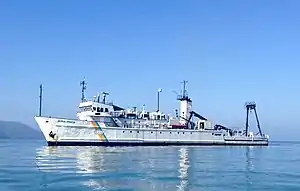 Alpha Crucis | |
| History | |
|---|---|
| Name |
|
| Owner | |
| Completed | 1974 |
| General characteristics | |
| Type | Research vessel |
| Length | 64 m (210 ft) |
| Beam | 11 m (36 ft 1 in) |
| Endurance | 40 days |
Alpha Crucis is the most recent oceanographic research vessel in Brazil, replacing the older Wladimir Besnard research vessel. It is named after the Alpha Crucis star system that represents São Paulo state in the Brazilian flag.[1] It is 64 metres (210 ft) long and 11 metres (36 ft 1 in) wide, and has capacity for 25 researchers and is capable of remaining 40 days without being resupplied.[2]
Acquisition
The vessel was built in 1974, and was originally called Moana Wave. It was firstly owned by the University of Hawaii. In 2010, the Foundation for Research Support of the State of São Paulo funded the acquisition of Alpha Crucis after a fire in 2008 rendered RV Wladimir Besnard inoperable.[3] It is now administered by the University of São Paulo.
Projects
The vessel is being used for several research projects in Brazil, in topics such as global climate change and biodiversity.[1]
References
- 1 2 Revista Fapesp. "A saga do Alpha Crucis". Retrieved 30 October 2012.
- ↑ SP Noticias. "Governador inaugura navio Alpha Crucis". Retrieved 30 October 2012.
- ↑ Usp Imprensa. "Fapesp e USP inauguram o navio oceanográfico Alpha Crucis no dia 30/05". Archived from the original on 9 July 2019. Retrieved 30 October 2012.